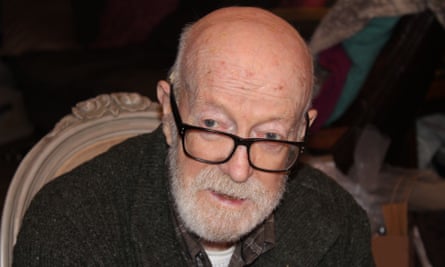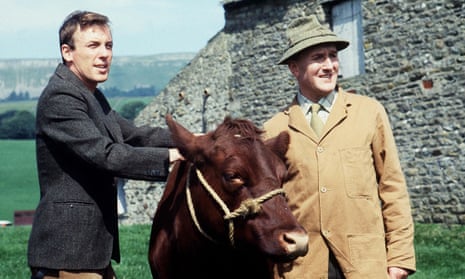The television producer Bill Sellars, who has died aged 93, was in charge of a number of popular BBC dramas, notably every episode of All Creatures Great and Small. Based on the experiences and bestselling books of the vet Alf Wight (writing as James Herriot), the series depicted life in a 1930s veterinary practice in rural Yorkshire.
Sellars devised the show and cast it perfectly, signing Christopher Timothy to play James (resisting pressure from above to hire a big star), the veteran actor Robert Hardy for the key role of the tetchy senior vet Siegfried Farnon and a young Peter Davison as his brother, Tristan Farnon. Each man was often called upon to perform scenes elbow-deep in the back end of a cow, but this adherence to realism and the chemistry between the characters gave the show an extra dimension. Carol Drinkwater (and later Lynda Bellingham) rounded out the cast as Herriot’s wife, Helen.
All Creatures Great and Small began in 1978 and ran for three series until 1980: two specials followed, in 1983 and 1985. Sellars spent two years persuading Wight to allow the show to continue using original stories (the source material had by then run out) and secured a new run from 1988 to 1990. It sold around the world and regularly attracted more than 15 million viewers, peaking at 18.7 million.
Loyal viewers were lured by the programme’s evocative theme music, charming period trappings, naturally beautiful scenery and colourful characters. It was nominated for a Bafta award for best drama series in 1979 and for a Primetime Emmy in 1990.

Bill was born in Tideswell, Derbyshire, to Carlyle Sellers, a printer, and his wife Blanche (nee Longstone), and left school aged 14 to work in a factory. Towards the end of the second world war he served with the 11th East African Royal Artillery Regiment and then joined the Combined Services Entertainment company, touring India and entertaining the troops with his comic turn.
After demobilisation he secured his first professional theatre engagement as an assistant floor manager in 1947 at Grange-over-Sands, Lancashire (now part of Cumbria), before long runs in repertory theatre in Derby (where he first started directing) and Northampton. When he started working professionally in the theatre he did not want people to associate him with Peter Sellers, so he changed the spelling of his surname to Sellars.
In 1958 he secured a short-term contract from the BBC as a floor manager, soon rising to the role of production assistant, but a mass exodus of staff to the newly formed ITV network led to a shortage of directors and so he found himself overseeing the popular soap operas Compact (concerning the glamorous world of magazine publishing, 1965-66), 199 Park Lane (set in a luxury block of flats, 1965) and the football-themed United! (1965-66).
The scripts for the Doctor Who story The Celestial Toymaker (1966) needed emergency rewrites very close to production but, despite this, the offbeat and unusual story is fondly remembered. Sellars pulled off a casting coup by persuading Michael Gough to play the Toymaker, and the story’s nightmarish subversion of children’s parlour games makes it stand out as an intriguingly atypical entry into the series’ canon.
Starting off as a director on a twice weekly soap, The Newcomers, by 1967 Sellars was the show’s producer and responsible for hundreds of episodes, most of which were transmitted live.
He later produced The Doctors (1971) and its spin-off Owen MD (starring Nigel Stock, 1973). Diverse fare such as The Terracotta Horse (1973), The Chinese Puzzle (1974), Five Red Herrings (1975, starring Ian Carmichael as the Dorothy L Sayers creation Lord Peter Wimsey), the final two series of the hit business drama The Brothers (1976) and The Little World of Don Camillo (1981) followed. When the producer Martin Lismore was killed in a car accident in 1977 Sellars took over his final production, Murder Most English, but refused to replace his friend’s name on the titles and so received no onscreen credit.
He created the series Triangle (1981), which was an unsuccessful attempt to inject drama and glamour into a ferry crossing from Felixstowe to Gothenburg to Amsterdam. Dreary weather, the seasickness that beset cast and crew, and the difficulty lighting the real-life ferry on which the series was shot, all conspired against it.
Sellars came back fighting, and One by One (1984-87), based on the Zoo Vet books by David Taylor, was another popular animal-themed success. When he retired from the BBC in 1990 he became the artistic manager of the Georgian Theatre Royal in Richmond, North Yorkshire.
After divorce from his wife, the actor June Bland, whom he had married in 1950, Sellars moved to Spain with his civil partner, Alan Sandilands. Sandilands died in 2012. Sellars returned to the UK and in 2013 he and his former wife remarried.
She survives him, as do their son, Paul, and two daughters, Janine and Lindy.

Comments (…)
Sign in or create your Guardian account to join the discussion